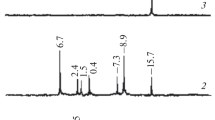Abstract
The effect of the composition of bismuth-tin-antimony catalysts on the composition of the products of allylic oxidation of propylene has been studied. The substitution of antimony by bismuth decreases the acrolein yield and increases the yields of oxidative dimerization products. The activity and selectivity of molybdenum oxide in the oxidation of propylene and allyl bromide have been compared with those of bismuth molybdate. In the oxidation of allyl bromide, the activity and selectivity of molybdenum oxide have been found to approach those of bismuth molybdate. Using the results and literature data, it has been concluded that low-valent cations (bismuth, tin) are responsible for the formation of allylic surface complexes, and high-valent ions (molybdenum, antimony) participate in the oxidation of these complexes to acrolein.
Abstract
Изучено влияние состава висмутоловосурьмяных катализаторов на состав продуктов аллильного окисления пропилена. Показано, что замещение сурьмы на висмут приводит к снижению выхода акролеина и увеличению выхода продуктов окислительной димеризации. Сопоставлены активность и селективность окиси молибдена и молибдата висмута в реакциях окисления пропилена и бромистого аллила. Установлено, что при окислении бромистого аллила активность и селективность окиси молибдена приближаются к соответствующим величинам для молибдата висмута. На основании полученных результатов, а также литературных данных сделан вывод, что низковалентные катионы (висмут, олово) ответствены за образование поверхностных аллильных комплексов, а высоковалентные (молибден, сурьма) участвуют в окислении этих комплексов в акролеин.
Similar content being viewed by others
References
A. I. Gelbstein, S. S. Stroyeva, N. V. Kulkova, Yu. M. Bakshi, V. L. Lapidus: Neftekhimiya,5, 118 (1965)
T. Seiyama, M. Egashira, T. Sakamoto, J. Aso: J. Catal.,24, 76 (1972)
J. Haber, B. Grzybowska: J. Catal.,28, 489 (1973)
Ph. A. Batist, B. C. Lippens, G. C. A. Schuit: J. Catal.,5, 55 (1966).
J. M. Peacock, M. J. Sharp, A. J. Parker, P. G. A. Ashmore, J. A. Hockey: J. Catal.,15, 379 (1969).
L. Ya. Margolis: J. Catal.,21, 93 (1971)
G. W. Godin, C. C. McCain, E. A. Porter: Proc. IVth International Congress on Catalysis, Moscow, 1968, Vol. 1, p. 232. Izd. Nauka 1970.
A. P. Kuliyev, V. D. Sokolovski, T. V. Andrushkevich, G. K. Boreskov, O. A. Kozmenko: Dokl. Akad. Nauk SSSR,211, 897 (1973)
V. I. Lazukin: in Kataliz i Katalizatory, Vol. 5, Izd. Naukova Dumka, Kiev 1963
V. I. Lazukin, M. Ya. Rubanik, Ya. V. Zhigailo, A. A. Kurganov, Zh. F. Buteiko: in Kataliz i Katalizatory, Vol. 2, Izd. Naukova Dumka, Kiev 1966.
M. M. Agaguseinova, K. Yu. Adzhamov, T. G. Alkhazov: Azerb. Khim. Zh.,5 (1974).
T. Uda, M. Egashira, T. Seiyama: J. Chem. Soc. Japan, Chem. and Ind. Chem.,4, 853 (1973).
Author information
Authors and Affiliations
Rights and permissions
About this article
Cite this article
Gamid-Zade, E.G., Kulivev, A.R., Mamedov, E.A. et al. On the role of individual elements of complex oxides in the partial oxidation of olefins. React Kinet Catal Lett 3, 191–198 (1975). https://doi.org/10.1007/BF02187513
Received:
Issue Date:
DOI: https://doi.org/10.1007/BF02187513




